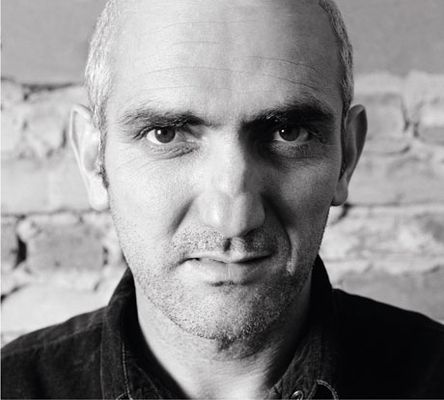A few days before I was scheduled to interview Paul Kelly, I happened to be in Newcastle, watching a singer-songwriter night in a quiet bar. A rangy looking man stood up and performed a halting, anguished cover of Kelly’s song ‘How To Make Gravy’. In the lyrics, a man calls his brother from jail, just before Christmas. He passes on his gravy recipe, together with an extra serving of regret. It’s the kind of taut, empathetic storytelling for which Kelly has been acclaimed throughout a career spanning 30 years and two-dozen albums and soundtracks.
Now he’s added a ‘mongrel memoir’ to his catalogue – also called How To Make Gravy. ‘The title suits the way the book mixes things up,’ he explains, on the phone from his St Kilda home. ‘You’re cooking a roast, and you throw in a bit of this and that, and you make gravy. That’s what writing the book felt like to me: it was a by-product of something else.’
In 2004, when the Spiegeltent first arrived in Melbourne, Kelly performed a series of special shows. Over four nights, he sang 100 of his songs in alphabetical order, and leavenedthe one-man act with a selection of stories. Audiences gobbled it up, and he later toured the format around Australia and overseas. How To Make Gravy follows the same A-to-Z structure. Each chapter contains the lyrics to a song, together with an anecdote. The result is something like a big, snug patchwork quilt, in which Kelly has stitched stories about his family history and song-writing, together with pop music lore, literary references, band travel yarns, and hard-won life experience. There are even occasional puzzles.

‘I wrote it in sequence, starting with the letter A. Some stories I had for a while, but generally, when I sat down I didn’t know what I was going to write. It was only when I got to the Ds or Es that I had the confidence to say, “I think I’m writing a book”,’ Kelly says, sounding surprised he ever got through it. ‘Ididn’t set out to write a memoir. I just used the songs as a jumping-off point to write in a different way. ‘Love Never Runs On Time’ had one little mention of bad coffee in it, so I thought I’d write about the struggle to get a good coffee on the road.’
He strove for his writing to be ‘companionable’ – and it is. It’s the kind of book you read with a smile on your face. You get up to make a cup of tea, and notice you’re still smiling, and humming too, and pondering some dusty escapade from your childhood. Or you might be contemplating one of Kelly’s lists. The book is full of them: from Good Smells (Bakeries at dawn, Onions frying…), to They Don’t Make Names Like This Any More (Frank Necessary, Earl Scruggs…). ‘I’ve been a bit of a lister,’ he says. ‘I like list poems. Walt Whitman is the obvious example – the poet who lists. A few of my list poems snuck into the book, like Reasons To Wear Black (Roy Orbison, Johnny Cash…). And I would often use lists to get me started writing.’
In one sense the whole book is a list, an extended tribute to Kelly’s many collaborators and to his eclectic sources of inspiration, both musically and intellectually. The ‘Index Of People and Bands’ runs to eight pages of tiny type, and includes poets, playwrights, authors and activists, as well as musicians.
‘I’ve always seen myself as a collaborative writer,’ he says. ‘I’ve relied on other musicians to realise my songs – I don’t write bass lines or guitar riffs. Then there’s the invisible collaboration, which is the books read and the music listened to. And there was always letter-writing with friends and family.’
As the chapters roll on, Kelly reflects on friends who’ve influenced him and those who’ve died, on aging and the passing of time. In the chapter corresponding to the song Winter Coat, he describes listening to a Frank Sinatra album in the dark on the night Ol’ Blue Eyes died. After surrendering to an overwhelming sense of loss and fading possibility, he emerged ‘refreshed by tears…and glad somehow to be sad’.
‘Looking at the book at the end, I realised that it’s all about time, death and getting old. You get over 50 and you can’t help it,’ he laughs. In any case, for him, the subject isn’t wholly grim. ‘No one can do anything about loss. But you can be attuned to it, respond to it, and derive some joy from it, because it’s part of life.’
Back at the singer-songwriter night in Newcastle, when the rangy singer sat down after performing the heart-rending cover, a punter approached him, bearing compliments: ‘Great song choice man – I love Paul Kelly. He’s a voice for the nation.’ ‘Yeah,’ the singer replied. ‘Everybody loves him.’ As I listened in, I could scarcely believe my good fortune.
But, of course, when I tell Kelly the story, he has none of it. ‘Oh, well, I think you tend to hear about it more often when people like you than when they don’t,’ he says humbly, after stifling an awkward cough. He does, however, admit to nerves about the way people will respond to How To Make Gravy. ‘My CDs are fiction,’ he says. ‘This is like standing naked in the street.’
Michael Green is a freelance journalist (


